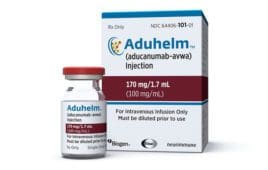 FDA has approved the Aduhelm (aducanumab) from Biogen (BIIB), the first novel Alzheimer’s drug treatment, in 18 years despite drug companies pumping billions of dollars into more than 400 clinical trials.
FDA has approved the Aduhelm (aducanumab) from Biogen (BIIB), the first novel Alzheimer’s drug treatment, in 18 years despite drug companies pumping billions of dollars into more than 400 clinical trials.
The news caused Biogen’s share price to jump from $286.14 to $395.85 — a 38.34% increase.
“Alzheimer’s disease is a devastating illness that can have a profound impact on the lives of people diagnosed with the disease as well as their loved ones,” said Dr. Patrizia Cavazzoni, director of the FDA’s Center for Drug Evaluation and Research, in a statement. “Currently available therapies only treat symptoms of the disease; this treatment option is the first therapy to target and affect the underlying disease process of Alzheimer’s. As we have learned from the fight against cancer, the accelerated approval pathway can bring therapies to patients faster while spurring more research and innovation.”
“This approval is a victory for people living with Alzheimer’s and their families,” said Harry Johns, Alzheimer’s Association president and CEO, in a statement. “This is the first FDA-approved drug that delays decline due to Alzheimer’s disease.”
It remains to be seen, however, just how big of a blockbuster Aduhelm will be. The FDA’s approval is conditional, requiring Biogen to run a confirmatory clinical trial for the drug. Some Alzheimer’s experts have stressed that they won’t prescribe aducanumab, citing a lack of convincing evidence that it is effective. Last November, an FDA advisory committee also expressed reservations about aducanumab’s clinical trial data. Three of those members explained their reasoning in a March editorial in JAMA.
But optimists stress that Aduhelm’s approval could also mark a turning point in treating Alzheimer’s disease (AD). “Aduhelm is the first therapy to target and affect the underlying disease process of AD,” said Alessio Brunello, managing analyst at GlobalData. “Currently, the available therapies only treat symptoms of the disease, whereas this drug actually works to clear amyloid plaques in the brain.”
Still, Brunello notes that aducanumab, as infusion therapy, could pose hurdles for some patients. “Additionally, concerns regarding the development of amyloid-related imaging abnormalities (ARIAs) represent a barrier for the uptake for Aduhelm,” he added. “Physicians will also be obliged to do regular MRIs on patients to see if they have ARIA reactions, which could be a limitation, as repeated MRIs represent an additional economic burden.”
Most significantly is the drug’s price tag of approximately $50,000 annually, which may limit support from payers.
GlobalData nevertheless projects aducanumab will rake in $5.5 billion internationally by 2027.
FDA’s decision to approve the drug in light of the available clinical data appears to be a “compromise between uncertainties about
the trial results and the large unmet need,” according to Bloomberg Intelligence. “Debate will now shift to providers and payers, though
we expect strong patient demand. Pending results of the confirmatory study, which may not be available for one to two years, Biogen’s high-stakes gamble appears to have paid off.”
The approval could also embolden FDA critics, such as the progressive advocacy group Public Citizen, which has accused FDA’s Office of Neuroscience of prioritizing the pharma industry over patients.
Already, the independent nonprofit Institute for Clinical and Economic Review (ICER) released a statement saying FDA, in its decision to approve aducanumab, has “failed in its responsibility to protect patients and families from unproven treatments with known harms.”
The financial analyst firm Canaccord Genuity has a more optimistic take. “Some might take profits here, but we continue to like the stock as today’s approval allows BIIB to play much more strategic offense versus what was a largely defensive posture earlier forced by competition to core products such as Tecfidera, Spinraza, etc.,” wrote Canaccord Genuity analyst Sumant Kulkarni in a briefing note. “From an ex-adu standpoint, we also like the setup for BIIB going into partner’s SAGE’s imminent Ph. 3 WATERFALL top-line data for zuranolone (major depressive disorder), which we also view as a product with significant market potential.”
Filed Under: Neurological Disease



